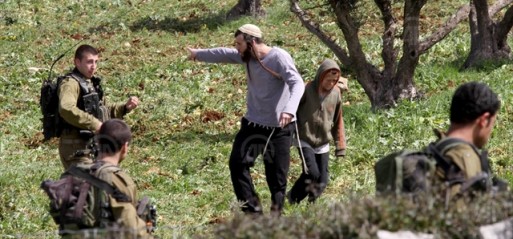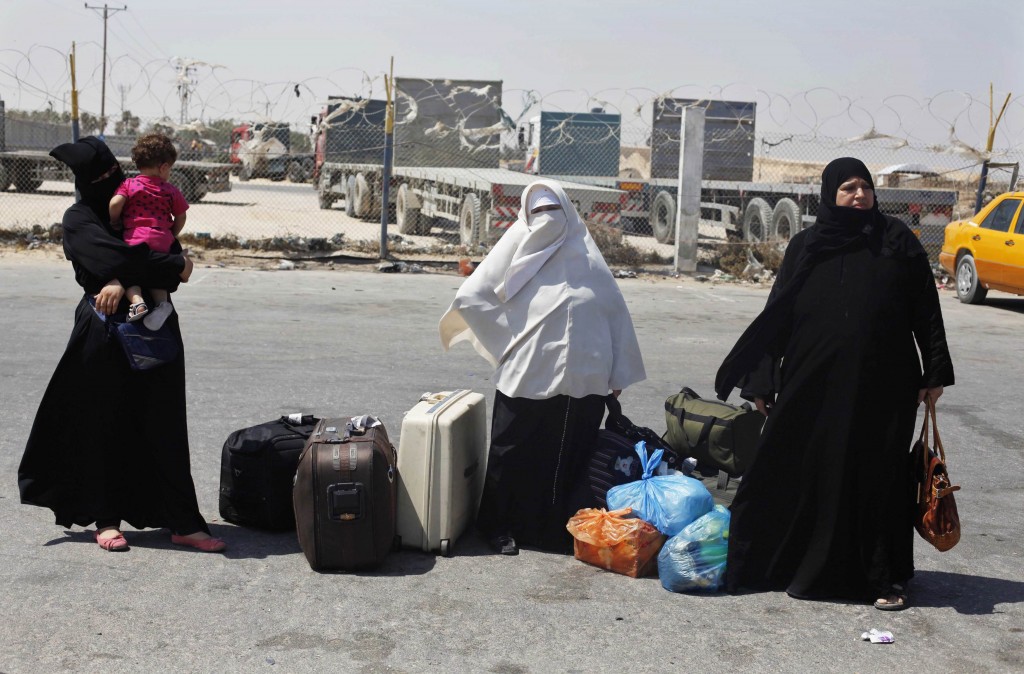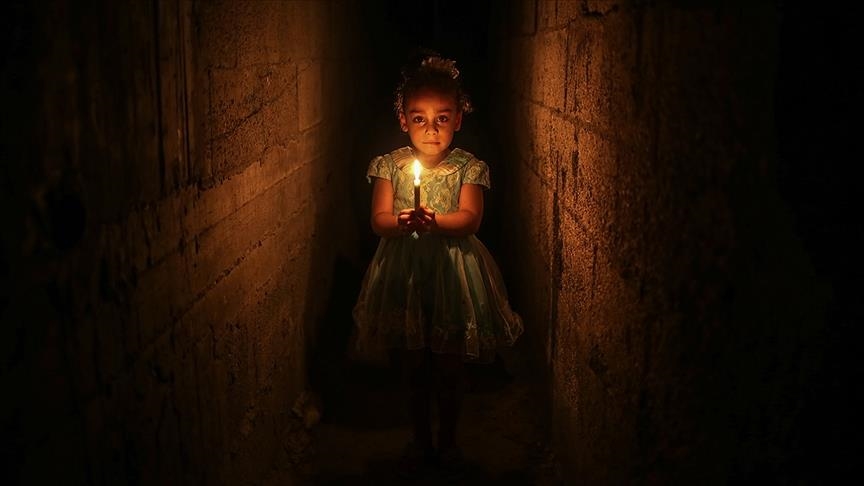
Israeli settlers threaten Palestinian farmers in Qasra.
West Bank Settlers Threaten Palestinians;
Leave Bloody Dolls as Warnings to Flee or Die
Brett Wilkins / Common Dreams
(October 27, 2023) — The revelation in recent days of two separate Israeli plans for the permanent expulsion of Palestinians from Gaza has stoked fresh fears of ethnic cleansing in the besieged strip, while Jewish settlers in the illegally occupied West Bank are vowing to slaughter Palestinians there if they don’t flee to Jordan.
As Israeli forces continue to pulverize Gaza with air and artillery strikes ahead of an expected major ground invasion—killing more than 7,300 Palestinians, wounding nearly 19,000 others, and displacing over 1.4 million residents—some Israeli leaders are formulating plans for the recolonization of Gaza.
The Israeli business daily Calcalist first reported a plan by Israeli Intelligence Minister Gila Gamliel to forcibly expel Gazans into Egypt’s Sinai Peninsula, which borders Gaza, after the war. Calcalist viewed a document bearing the Intelligence Ministry’s logo that was obtained by the Settlement Headquarters movement, which seeks to recolonize Gaza 18 years after Israeli troops and settlers withdrew from the coastal strip.
Gamliel envisions a course of action “that will yield positive and long-term strategic results” and involves the forced transfer of all Gazans into Egypt, a removal that would be carried out in three stages. First, tent cities would be built in the Sinai southwest of Gaza. This would be followed by the creation of a “humanitarian corridor” to aid evacuees. Finally, cities would be built in northern Sinai to permanently house Gazan refugees.

Leaked Document on Ethnic Cleansing Plan
A leaked document from Israel’s Intelligence Ministry lays out plans for forcibly displacing Palestinians from Gaza to the Egyptian Sinai peninsula. It states this plan is “liable to provide positive & long-lasting strategic results.”
The plan also calls for the creation of a “sterile zone” several kilometers wide to prevent Palestinians from returning to Gaza, as well as efforts to persuade countries to act as “absorption baskets” for displaced Gazans. European countries such as Spain and Greece, North African nations, and Canada are all mentioned as possible resettlement destinations.
Referring to previous schemes to expel Palestinians from Gaza—most notably the mid-2000s Eiland Plan—the Boycott, Divestment, and Sanction (BDS) movement for Palestinian rights asserted Thursday that “Israel’s plan to ethnically cleanse 2.3 million Palestinians from Gaza is not a result of its current genocidal war. It is by design and must be stopped!”
Some Israelis expressed a strong desire to recolonize Gaza.
Zevulun Kalfa, a 61-year-old administrative official in the Israeli kibbutz of Sa’ad—located less than three miles from the Gaza border—toldTheTimes of Israel Thursdaythat “we have children and grandchildren who dream of returning” to recolonize the strip
“It cannot be more dangerous to have our families inside Gaza than next to Gaza,” Kalfa contended, noting the 1,400 Israeli civilians and soldiers killed by this month’s Hamas-led attacks in southern Israel.
“As soon as the government decides, we’re ready,” he added.
A separate plan published by the Israeli think tank Misgav Institute for National Security & Zionist Strategy and reported by Middle East Eye examines the economics of forcibly transferring Gazans to the Sinai.
“There is currently a unique and rare opportunity to evacuate the entire Gaza Strip in coordination with the Egyptian government,” wrote Amir Weitmann, the plan’s author and chair of Likud’s Libertarian faction.
“An immediate, realistic, and sustainable plan for the resettlement and humanitarian rehabilitation of the entire Arab population in the Gaza Strip is required, which aligns well with the economic and geopolitical interests of Israel, Egypt, the USA, and Saudi Arabia,” he added.

“The Time to Act Is Now”
Weitmann proposes relocating Gaza’s 2.3 million people to the new satellite cities being built around Cairo, a move he estimates will cost between $5-$8 billion dollars.
“Throwing an immediate stimulus… to the Egyptian economy would provide a tremendous and immediate benefit to [Egyptian President Abdel Fattah] El-Sisi’s regime,” he wrote.
Weitmann added that it is uncertain if there will ever again be such a fortuitous opportunity to reclaim Gaza; therefore, “the time to act is now.”
“This is an innovative, cheap, and sustainable solution,” the report states. “Over time this is actually a very worthwhile investment for Israel… Gaza would provide high-quality housing for many Israeli citizens.”
The vast majority of Gazans are the descendants of Arabs ethnically cleansed from other parts of Palestine in 1947-49 during the creation of the modern state of Israel—and some of them are elderly survivors of what Palestinians call the Nakba, or “catastrophe,” when more than 750,000 people were forced from their homes, often by massacre or threat thereof, to make way for Israeli colonists.
Hundreds of Palestinian towns and villages were destroyed as 85% of the Arab population was expelled, never to return despite a guarantee to do so under United Nations General Assembly Resolution 194, which was passed in 1948. Some elderly refugees and their descendants still hold the keys to their old homes—and hopes of returning to them.
Numerous observers have contended that Israel is seeking to perpetrate a “second Nakba” in Gaza—or that it already is, citing genocidal statements from Israeli leaders and the order for 1.1 million residents in the northern part of the besieged strip to flee for their lives.
While the world is focused on the horrors of Gaza, Israeli soldiers and settlers have killed more than 100 Palestinians and wounded nearly 2,000 others in the illegally occupied West Bank, where Jewish colonists are threatening to start a “great Nakba” if Arab residents don’t pack up and permanently leave their homes and farms and flee to neighboring Jordan.
“Run to Jordan before we kill our enemies and expel you from our Holy Land, promised to us by God,” reads one leaflet distributed by settlers in Salfit.
Canadian Al Jazeera journalist Sana Saeed warned that “a second Nakba is being constructed before our eyes.”
Near Marjat on Thursday, settlers left dolls covered in blood or a substance meant to mimic it on the ground or strung up outside the entrance of a school.
On Friday, settlers in military gear invaded Marjat, hanging Israeli flags on a home near the school where the bloody dolls were found.
Jordan’s King Abdullah said last week that the forcible displacement of Palestinians into his country would be a war crime.
Earlier this month, El-Sisi also vehemently rejected the idea of forced resettlement of Palestinians in the Sinai.
“Transferring refugees from the Gaza Strip to Sinai would simply amount to relocating their resistance,” the president said in a televised speech on October 18, “turning Sinai into a launch pad for operations against Israel and granting Israel the right to defend itself and its national security by conducting strikes on Egyptian land in retaliation.”
Egyptian leaders bristle at Western suggestions that they take in Palestinian refugees, with one senior Cairo diplomat reportedly telling a European Union counterpart earlier this week: “You want us to take 1 million people? Well, I am going to send them to Europe. You care about human rights so much—well, you take them.”

‘Massacres Will Be Done in Total Darkness’:
Huge Israeli Assault Amid Blackout in Gaza
Jake Johnson / Common Dreams
(October 27, 2023) — People reportedly lost all access to internet and communication services across the Gaza Strip on Friday night as Israel announced an expansion of its ground attack and launched what observers described as the largest aerial assault since its latest bombing campaign began nearly three weeks ago.
Al Jazeera reported that it has only “sporadic communication” with its correspondents on the ground in the besieged Gaza Strip. The outlet has been able to go live intermittently via satellite phones.
Reporting from Khan Younis, a city in southern Gaza, Al Jazeera‘s Tareq Abu Azzoum said that “we don’t know anything that is happening in other districts in the territory.”
“We are now in a hospital and we are going to be live by satellite as much as we can and every single hour,” he continued. “So please, if you can hear us, send that message to the world that we are isolated now in Gaza. We don’t have any phone signals. We don’t have any internet connections.”
The Palestinian Red Crescent Society said it has “completely lost contact with the operations room in Gaza Strip and all our teams operating there due to the Israeli authorities cutting off all landline, cellular, and Internet communications.”
“We are deeply concerned about the ability of our teams to continue providing their emergency medical services, especially since this disruption affects the central emergency number ‘101’ and hinders the arrival of ambulance vehicles to the wounded and injured,” the group said. “We are also worried about the safety of our teams working in Gaza Strip as the continuous and intense Israeli airstrikes around the clock indicate that the Israeli authorities will continue to commit war crimes while isolating Gaza from the outside world.”
Like Al Jazeera and other outlets, The Associated Press reported trouble contacting people in the Gaza Strip.
“The Associated Press‘ attempts to reach people in Gaza did not go through,” the outlet said Friday.

“We are likely to soon find out about
the biggest massacres we’ve seen yet.”
Friday’s onslaught came at the tail end of a particularly deadly week in Gaza, where Israeli airstrikes have killed more than 7,000 people in just three weeks. Israel Defense Forces (IDF) spokesman Daniel Hagari announced Friday that in addition to ramping up its airstrikes, the Israeli military is “expanding ground operations” in Gaza ahead of an expected full-scale invasion.
Israel has also largely kept up its illegal blockade of the Gaza Strip, depriving the territory of critical necessities—including fuel and electricity—and intensifying the enclave’s humanitarian crisis.
Israel’s airstrikes have severely damaged Gaza’s internet and telecommunications infrastructure, hampering people’s ability to communicate with their families and undermining journalists’ efforts to inform the world about events on the ground.
On Friday, the Palestinian telecommunications company Paltel announced “a complete disruption of all communication and internet services” due to the Israeli bombardment.
“The intense bombing in the last hour caused the destruction of all remaining international routes linking Gaza to the outside world,” the company said.
The London-based watchdog group NetBlocks wrote on social media that “live network data show a collapse in connectivity in the Gaza Strip with high impact to Paltel.”
Amid the intense bombing and communications blackout on Friday, Medical Aid for Palestinians director of advocacy Rohan Talbot relayed a message that a colleague delivered just days earlier.
“I’m afraid that there will be massacres and those massacres will be done in total darkness,” the unnamed colleague said, according to Talbot.
Palestinian-American political analyst Yousef Munayyer issued a similar warning on Friday.
“The Israeli military is carrying out its biggest strikes since the start of its war on Gaza right now, all the lights and communications are knocked out,” he wrote on social media. “We are likely to soon find out about the biggest massacres we’ve seen yet.”
Posted in accordance with Title 17, Section 107, US Code, for noncommercial, educational purposes.